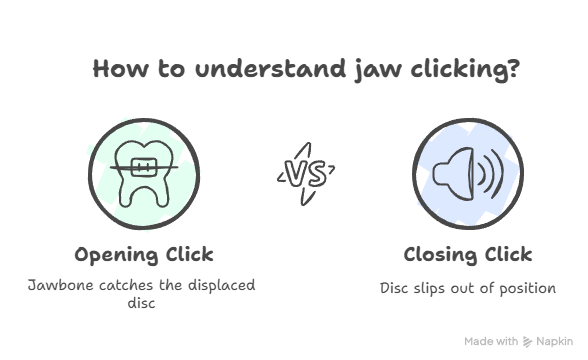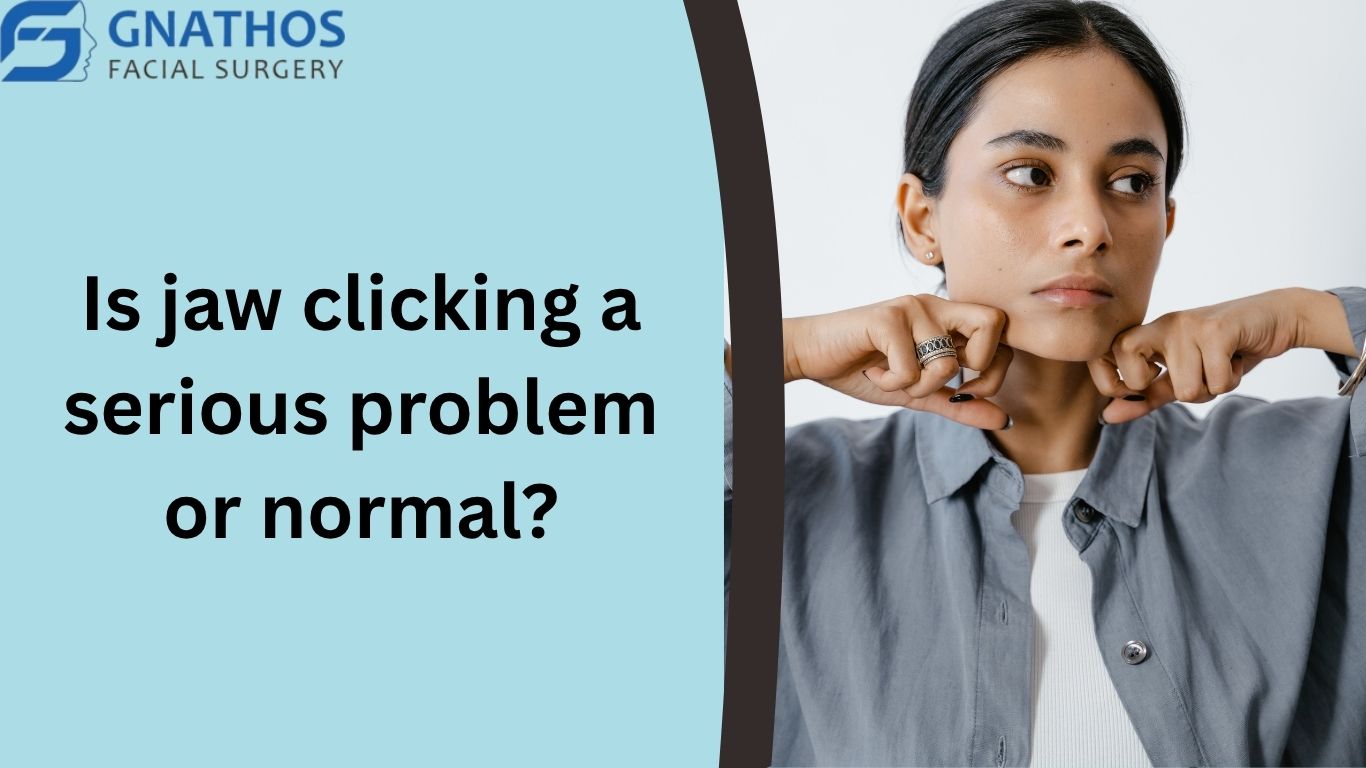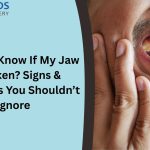You’ve probably noticed that little sound when you bite into an apple, chew on a piece of gum, or yawn widely—a subtle, sometimes noticeable “click” coming from your jaw joint, right in front of your ear. It might be loud enough to hear, or maybe just a feeling you sense inside your head. Naturally, a sound coming from your body’s moving parts can be alarming, which leads to a crucial question that many people ask: “Is jaw clicking a serious problem or normal?“
It’s a fantastic question because the answer isn’t a simple yes or no; it lies on a spectrum. For some, a jaw click is an incidental, harmless noise. For others, it’s the first red flag signaling a developing or worsening problem with the temporomandibular joint (TMJ). Today, we’re going to explore this spectrum in detail, helping you understand the mechanism behind the sound, when it’s considered normal, when it becomes a sign of a serious issue, and what you can do about it. Let’s dive deep into the world of jaw function and figure out where your jaw clicking falls!
Understanding the Mechanics of the Click
To truly understand if jaw clicking is a serious problem or normal, you need to know what’s physically happening inside your jaw joint—the Temporomandibular Joint (TMJ).
The TMJ is not just a simple hinge; it’s a complex sliding hinge. For smooth movement, nature placed a small, oval-shaped piece of cartilage between the two bones (the lower jaw and the skull) called the articular disc (or meniscus). This disc acts like a shock absorber and a lubricated pad, ensuring that the bones glide over each other without friction.
The Click Explained (Internal Derangement):

In many cases of jaw clicking, the sound is caused by a condition called internal derangement, where the articular disc has slipped slightly out of its ideal position on top of the lower jawbone (the condyle).
- Opening Click: As you start to open your mouth, the jawbone has to move forward. As it moves, it eventually catches the displaced disc and forces it back into its proper position, creating the audible click or pop.
- Closing Click: As you close your mouth, the disc can slip out of position again, often making a second click.
Essentially, the clicking sound is the disc snapping back into place, or slipping out of place, over the top of the jawbone.
Is Jaw Clicking a Serious Problem or Normal? The Spectrum
The severity of jaw clicking is determined by two main factors: Pain and Function.
A. The “Normal” or Less Serious Click (Painless and Functional)
In many individuals, jaw clicking is considered non-pathological, meaning it is not currently causing damage or requiring immediate intervention.
- Painless Clicking: The click is audible or felt, but it causes absolutely no pain in the joint, face, or surrounding muscles.
- Full Function: You have full range of motion; you can open your mouth wide (three fingers stacked vertically should fit between your upper and lower front teeth) without restriction.
- Stable Status: The clicking has been present for a long time, and it hasn’t gotten worse or changed in frequency or intensity.
Why it happens: This kind of clicking might be due to minor ligament laxity (looseness) or a slight, consistent, and stable displacement of the disc. While not ideal, if it’s painless and doesn’t affect function, it often requires only monitoring and avoidance of habits that might strain the jaw.
Is Jaw Clicking a Serious Problem or Normal?
Occasional jaw clicking without pain is often normal, but frequent clicking, discomfort, or limited movement can signal a TMJ disorder. Ignoring these signs may lead to chronic pain or joint damage. It’s best to get your jaw evaluated by an experienced TMJ specialist.
Book Your TMJ EvaluationB. The “Serious Problem” Click (Painful or Functional Impairment)
The clicking transitions from a normal variation to a serious problem when it is accompanied by certain “red flag” symptoms. This usually indicates a progressive Temporomandibular Disorder (TMD) that is actively impacting the joint structures and surrounding muscles.
| Red Flag Symptom | What It Means |
| Painful Clicking: | The click is immediately followed by, or accompanied by, sharp or dull pain in the joint or surrounding muscles. |
| Limited Opening (Locking): | The jaw gets temporarily stuck in an open or closed position. This means the disc is getting stuck in front of the condyle, preventing movement. This is a severe form of internal derangement. |
| Grating or Grinding Sound (Crepitus): | This is a sound like sandpaper or crushed cellophane. It’s much more serious than a click, as it often indicates that the cartilage has worn away and bone is rubbing against bone, a sign of advanced arthritis within the joint. |
| Widespread Pain: | The clicking is accompanied by chronic headaches (especially in the temples), ear pain (not an infection), neck pain, or facial muscle fatigue. |
| Progressive Changes: | The clicking has suddenly become louder, more frequent, or has appeared recently after trauma or a period of high stress. |
| Bite Changes: | You feel that your upper and lower teeth no longer align correctly, or your bite feels “off.” |
Export to Sheets
If your jaw clicking falls into this category, it is a significant signal that the underlying joint dysfunction needs professional evaluation and often, treatment.
The Role of Bruxism and Muscle Tension
It’s important to remember that the TMJ is surrounded by powerful muscles. Often, jaw clicking isn’t just about the disc; it’s heavily influenced by muscle tension caused by stress and grinding (bruxism).
- Stress and Clenching: High stress levels cause many people to unconsciously clench or grind their teeth, especially at night. This massive, sustained force strains the ligaments that hold the disc in place, making it more likely to slip and click.
- Muscle Fatigue: Overworked muscles can go into spasms, pulling the jawbone slightly out of its normal alignment and forcing the disc to move abnormally, leading to more clicking and subsequent pain.
Therefore, even a “normal” click can become a painful, serious problem if combined with chronic, untreated bruxism.
Steps to Take for Jaw Clicking: Finding Relief
If you have jaw clicking, especially if it’s painful or accompanied by other red flags, here’s your plan of action:
1. Self-Care (The First Line of Defense)
- Soft Diet: Give your jaw a rest. Avoid hard, crunchy, or chewy foods (like gum, raw carrots, steak) for a few weeks.
- Moist Heat: Apply a warm, moist cloth or heating pad to the tense jaw muscles (cheeks and temples) for 15 minutes, several times a day, to encourage relaxation.
- Avoid Extreme Movements: Try to control yawning and avoid opening your mouth as wide as possible. Do not chew gum or rest your chin on your hand.
- Over-the-Counter Relief: Non-steroidal anti-inflammatory drugs (NSAIDs) like ibuprofen can help reduce pain and inflammation in the joint.
2. Professional Evaluation
If self-care doesn’t help within a few weeks, or if your clicking is painful and persistent, you need to see a specialist. An Oral and Maxillofacial Surgeon (OMS) is the ideal professional to consult.
- Why an OMS? An OMS has extensive training in the diagnosis and treatment of the entire temporomandibular joint, its surrounding muscles, and the underlying skeletal structure. They can accurately determine if your clicking is merely mechanical or a sign of progressive internal derangement or arthritis.
Diagnosis and Treatment by an Expert:
An expert will use imaging (like an MRI) to see the exact position and condition of your disc. Treatment options, which depend on the severity, may include:
- Oral Appliance Therapy (Night Guard/Splint): A custom-made device to prevent destructive clenching and grinding, stabilizing the jaw and reducing the strain on the joint.
- Physical Therapy: Specialized exercises to strengthen muscles and improve the range of motion.
- Injections: Steroid injections into the joint to reduce inflammation, or Botox injections into the muscles to relieve severe tension and spasms.
- Arthrocentesis/Arthroscopy: Minimally invasive surgical procedures to flush the joint and repair minor disc or tissue damage (reserved for cases of persistent pain or locking).
Understanding that jaw clicking is a serious problem or normal is the first step toward getting the right treatment. Don’t simply live with the discomfort; seek professional guidance to prevent minor issues from becoming major, painful chronic conditions.
For a precise diagnosis and tailored treatment plan for your jaw clicking, consulting with a leader in the field is essential. Professionals like Dr. Suresh specialize in the intricate mechanics of the temporomandibular joint, utilizing advanced imaging and proven non-surgical and surgical techniques to restore comfort and function. If your clicking is painful, limiting your jaw movement, or accompanied by chronic headaches, schedule a consultation with Dr. Suresh. Entrusting your jaw health to this level of expertise is the best way to ensure a peaceful, pain-free future.
Is Jaw Clicking a Serious Problem or Normal?
Occasional jaw clicking without pain is often normal, but frequent clicking, discomfort, or limited movement can signal a TMJ disorder. Ignoring these signs may lead to chronic pain or joint damage. It’s best to get your jaw evaluated by an experienced TMJ specialist.
Book Your TMJ EvaluationFrequently Asked Questions (FAQs) About Jaw Clicking
If my jaw clicks but doesn’t hurt, does it still need treatment?
If your jaw clicking is painless and you have full range of motion, it usually does not require immediate treatment, but it should be monitored. It is recommended that you avoid habits like gum chewing or excessive jaw movements and mention it to your dentist, as a small, non-painful click can sometimes progress to a painful disorder over time, especially with chronic stress.
What is the difference between a jaw click and a jaw pop?
A jaw click and a pop are essentially the same sound, both referring to the articular disc snapping back into its proper position over the jawbone (condyle). The term “pop” is often used for a louder, more noticeable sound, while a “click” may be subtler, but both indicate some form of internal derangement within the temporomandibular joint.
Is the grating sound (crepitus) more serious than a click?
Yes, the grating or grinding sound known as crepitus is considered more serious than a simple click. Crepitus often indicates bone-on-bone friction due to significant cartilage wear or damage (arthritis) within the joint, suggesting a more advanced and potentially degenerative temporomandibular joint disorder that requires immediate professional evaluation.
Can stress and clenching cause jaw clicking?
Yes, stress and the resulting teeth clenching (bruxism) are major contributors to jaw clicking. The excessive, chronic force put on the jaw joint and muscles strains the ligaments that hold the disc in place, causing the disc to slip out of its normal position and resulting in the audible click or pop when the jaw moves.
Can my jaw clicking lead to a permanently locked jaw?
Yes, jaw clicking can be a precursor to a permanently locked jaw. The clicking signifies that the joint disc is slipping out of place and returning. If the disc slips out of place and gets stuck in front of the jawbone, preventing the jaw from opening wide, it is called a “closed lock” and requires immediate professional intervention to regain function.
Will a simple over-the-counter night guard help my jaw clicking?
An over-the-counter night guard may help reduce the destructive forces of grinding and clenching, but it is often less effective for treating a clicking joint than a custom-made oral appliance. A custom splint is designed by a specialist to position the jaw precisely, which can sometimes help stabilize the joint disc and reduce the severity or frequency of the clickin












